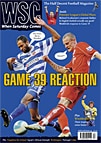 The Italians are going off the English model, says Matthew Barker
The Italians are going off the English model, says Matthew Barker
Having long been the mantra of choice for would-be reformers of the sport here, adopting the modello inglese is beginning to lose its appeal. Italian reaction to the Premier League’s proposals for a 39th game generally chimed with Michel Platini’s widely reported comments about foreign owners, foreign coaches, foreign players and now foreign fans: that English football had finally gone a step too far and was steadily losing its soul.
The media were quick to take the moral high ground, dismissing the plans as a means to make a fast buck/yen at the expense of the English domestic game (“Needless to say, the motivation is purely economic,” said Gazzetta dello Sport). Many pointed out that one factor in the English national team’s failure to qualify for Euro 2008 was the state of the Wembley pitch following the NFL game between the Miami Dolphins and the New York Giants just a few weeks before. The clear message was that the globalisation of sport can be a risky business.
“Try to imagine Inter playing Juventus in the snow of Tibet, or Napoli v Roma among the kangaroos and koala bears on the slopes of Ayres Rock,” scoffed Corriere dello Sport. And yet of course Italian clubs have long been adept at “leveraging their brands” into overseas territories. Imagining Juventus against Parma in Tripoli, or Milan v Torino in Washington DC, is certainly easy enough, because these matches have already happened (the former in 2002, the latter 1993). Three Supercoppa Italiana games, Italy’s equivalent of the Community Shield, have been played overseas – Juventus also met Milan at the Giants Stadium near New York in 2003.
As well as the usual pre-season tours, Milan and Inter enjoyed lucrative stays in Dubai during this year’s mid‑winter break, while Juventus did some gentle stretching exercises and shirt-signing in Malta. Milan’s victory in the Club World Cup, played in Tokyo last December, was spun as another golden success for the rossoneri, but disgruntled fans have pointed to the upheavals of crossing time-zones and missing two Serie A weekends as another reason behind the club’s disappointing league form.
Satellite TV was roundly denounced as the big, bad driving force behind all this potential continent‑straddling. Fair enough, but there has also been more than a little resentment underlying some of the criticism of English expansion plans. Italians have had to sit back and watch over the past decade as the Premier League has eclipsed their domestic game, growing ever more powerful and hogging the international spotlight.
In recent years Tokyo has been mooted as a possible destination for another Supercoppa; in 2003 the then league president Adriano Galliani told journalists that the game would be played “wherever they give us the most money”. Now, however, following the calciopoli scandals and the deaths of policeman Filippo Raciti and fan Gabriele Sandri, the Italian game finds itself in a noticeably less bullish mood.
From WSC 254 April 2008